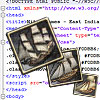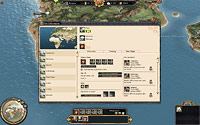- Overviews
- East India Company
- Pirate Bay
- Privateer
- Designer's Cut
- Battle of Trafalgar
- Collection
- Ship Introductions
- Designer's Blog
- Developer's Video Diary
- Modding Instructions-series
 9th October 2009:
9th October 2009:Modding part 6.
This time we learn how to translate the East India Company to your own language.
Read more » 15th July 2009:
15th July 2009:Naval warfare, part II.
Lead designer Kim Soares takes the helm of a frigate and shouts: "Port side, FIRE!"
Read more »
 Keep yourself posted on the latest news about East India Company.
Keep yourself posted on the latest news about East India Company.
Email-address:
 Sign up for the Paradox newsletter, and get all the news directly from Paradox Interactive.
Sign up for the Paradox newsletter, and get all the news directly from Paradox Interactive.
Email-address:


Designer's Blog: Care to negotiate?
Great soldier and military theorist Carl von Clausewitz said that War is extension to diplomacy. I could not agree more with Mr. von Clausewitz and so, as war is major part of EIC so too is diplomacy.
Diplomacy in games has always been hard feature to tackle. Much too often "ground breaking" diplomacy turns out to be just bartering with gold, technology, money and alliances.
Items on the table might not be wood, iron or fish, but it is obviously simple trading with different label. If you bitch about something, you should come up with better, or at least improved, solution.
Because of this, we have put quite an effort into diplomatic negotiations in East India Company. The basic layout is very much the same as in Sid Meier's Colonization: You have your side of the table with your stuff and the opponent has his stuff on the other side.

Diplomatic ingredients
In East India Company you can build diplomatic offers from four different ingredients. These are money, trade items located at the warehouse of Company Home Port, ports themselves and diplomatic items.
Money does not need explanation. Trade items have monetary value as well, but in addition you might want them for other reasons than just plain profit. Ports are very valuable and some are extremely so. Throwing Calcutta on the table as part of the offer is sure to swing the balance around.
Diplomatic items are pacts and alliances, but you can also ask the other company to declare war to a third party. If you have lot to spend, this is good way to try and get rid of the competition without putting your own neck out on the harms way.
This far all this is still just fancy trading with different label. What makes me proud of diplomacy in East India Company is the dynamic nature of it all.

Enemy of your enemy is your friend
AI takes into account multiple variables when deciding if your offer if acceptable or just plain madness. For example, if you are trying to pay the French to declare war to the British, they consider not only how much you offer but also what you offer.
More importantly they take into account their relationship with both you and the British and the relative power of all three. If the British fleet outnumbers the French 10:1 you can be sure no amount of money or anything else will convince them to agree.
If you are the big bully it is easier to demand things from others. You can also resort to threatening with war. I do not remember seeing threats in any other game before. That is until I saw it in Empire: Total War last weekend. Well, good ideas can surface at the same time, but it would have been nice to be the first game with that option.

Anyway, you can't resort to threats or bullying based on your muscles all the time however. This is because AI companies have a memory. If one way or the other you force them to accept a deal they think is unfair, they will remember it and following negotiations are going to be that much harder. They do remember good deals too, which improves your standing in their eyes.
The result of all this is diplomacy logic that gives player a lot of options to do multiple things in multiple different ways.
Sometimes the reactions of your AI partner might seem irrational, but that is only because they act with reason. And that is realistic.
Kim Soares







